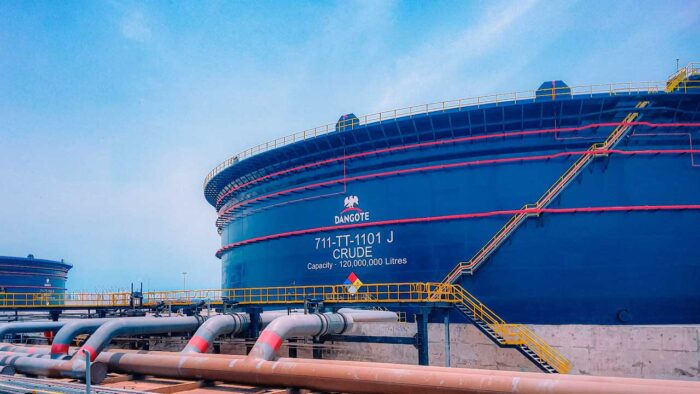Africa’s richest man, Aliko Dangote, has revealed that his refinery currently imports between 9 and 10 million barrels of crude oil every month from the United States and other countries due to problems with sourcing crude locally from Nigeria. He pointed fingers at international oil companies (IOCs), accusing them of frustrating the refinery’s operations.
Dangote, who is the President of Dangote Petroleum Refinery, made the shocking disclosure on Tuesday while speaking at the West African Refined Products Pricing and Markets Development Conference held in Abuja.
According to him, the refinery, located in Lagos, expected that getting crude oil in Nigeria would be easy since the country produces around 2 million barrels of crude oil per day. But the reality, he said, has been quite the opposite.
“At the project inception, it was reasonable to assume that in a country producing about 2 million barrels per day, securing crude would be the least of our worries. But we were wrong,” he told the audience.
Dangote stated that instead of buying directly from Nigerian oil producers, his refinery is often forced to deal with foreign trading firms who buy Nigerian crude in bulk and then resell to the refinery at very high prices. This, he said, has made local crude inaccessible and expensive.
“As we speak today, we buy about 9 to 10 million barrels of crude monthly from the United States and other countries,” he said.
Although he acknowledged that the Nigerian National Petroleum Company (NNPC) Limited has been supportive by supplying crude from the beginning of the project till now, he maintained that working with international oil companies has been the most difficult part of running the refinery.
Dangote also complained about serious issues in transporting crude oil. He said changes in shipping schedules by upstream operators, along with outrageous port and regulatory charges, are among the major headaches his refinery is facing.
He broke down the cost issues, saying: “Skyrocketing port charges make up about 40 percent of the total freight cost. This means it costs nearly as much to pay port fees as it does to charter a vessel — including the crew, insurance, and fuel.”
To make things worse, he said Indian refineries, which import crude from even farther away, are still paying less in freight and port charges than his refinery in West Africa.
“In terms of port charges, it is currently more expensive to load a domestic cargo of petroleum products from the Dangote refinery. Customers are forced to pay fees at both the loading point and again at the point of discharge,” he explained.
He compared this with competitors who load petroleum products in Lome, Togo, saying they only pay fees at the port of discharge. “This is simply unfair and unsustainable,” he added.
Dangote’s comments come just a few months after his $19 billion refinery began test production. The refinery, with a nameplate capacity of 650,000 barrels per day, is considered the largest single-train refinery in the world, and was built to reduce Nigeria’s heavy dependence on fuel imports.
Despite its potential to transform Nigeria’s energy landscape, the refinery has struggled to secure steady local crude supply, forcing it to look abroad. This, according to Dangote, is undermining the refinery’s goal of self-sufficiency and affordable refined petroleum products for Nigerians.
The business mogul urged the Nigerian government and relevant regulatory agencies to address these bottlenecks and create a fairer business environment. He stressed that the success of the Dangote refinery is not just a personal achievement, but a strategic national asset that can reduce fuel import bills, create jobs, stabilize fuel prices, and boost the economy.
